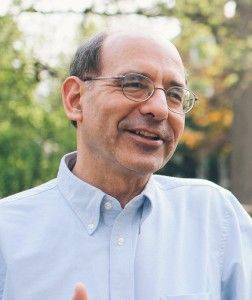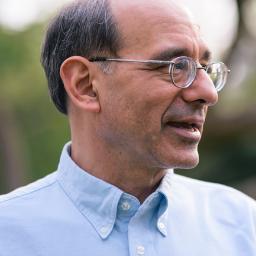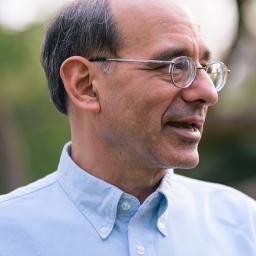 When I think of politician, I think lawyer, businessman, or economist. I don’t think many people think… “physicist.”
When I think of politician, I think lawyer, businessman, or economist. I don’t think many people think… “physicist.”
Democratic party candidate George Gollin is ready to break that tradition and bring a new type of personality to Washington D.C., one that will help him “find facts, rather than argue them,” as he likes to say.
George Gollin received degrees in physics from Harvard and Princeton and joined the University of Illinois at Urbana-Champaign a quarter-century ago; he and his family have been living in Champaign ever since.
George is now a candidate running for the House of Representatives for Illinois’ 13th Congressional District. He became interested in politics five years ago after he discovered a criminal gang selling fake college degrees and fought to not only expose and punish this group, but to create legislation that would prevent the recurrence of groups like these.
I first met Gollin when I decided to intern for his campaign and found him to have a warm and kind-hearted personality. He graciously agreed to let me interview him, and the following interview gives an overview of both his path into politics and his platform for the coming election.
———
SP: What classes do you teach at U of I?
George Gollin: This term I’m teaching Physics 212, intended for students in engineering and the physical sciences. I also advise three undergraduates who are writing senior theses based on their work in my laboratory.
SP: Was there a single moment or event that led to your interest in politics?
Gollin: My entrance into public life was unintentional. Five years ago, I came across a multi-million-dollar criminal gang selling fake college degrees—including MDs. I published a report about them and they came after me and my family. I fought back, and won… the Justice Department took up the case and the bad guys went to prison.
In response to information revealed by the investigation, I helped several Congressional offices to develop new legislation to combat the problem of diploma mills. The bill almost became law, but was gutted by a single Senator. I saw then that we needed major changes in Washington.
Not that long ago, members of Congress would compromise to solve problems, putting country before party. It is no longer this way: Congress does not listen to us, and many of our representatives serve the interests of the affluent, without representing all of their constituents.
This must stop, and I hope to play a role in fixing that which is broken in our governance.
SP: Do you think an education background is an advantage or disadvantage in politics (as opposed to a legal one, for example)? Why?
Gollin: It’s significant advantage. The nation’s capital is a city full of attorneys. I’m not: I’m a teacher and a scientist.
The law is an honorable profession, but attorneys are taught to argue about evidence, where scientists are trained to find facts, and act on them.
There is entirely too much argument in Washington now, and I’d say it’s no coincidence that there are 227 lawyers in Congress, but only three scientists. We need more facts and more solutions if we’re going to move our country forward.
Teachers are communicators, we engage and listen. And Washington needs more rational discussion if we’re going to get past gridlock.
SP: What is your political background?
Gollin: I was on the board of directors of the Washington-based Council for Higher Education Accreditation for six years. CHEA oversees postsecondary accreditation, and plays a leadership role in defining and promoting public policy. The amount of money in play—there is close to $200 billion in federal loans made available to students every year—makes CHEA’s activities highly political.
While on the CHEA board, I also spent a significant amount of time doing advocacy on Capitol Hill for the diploma mill bill.
SP: What are some of the main points of your platform?
Gollin:
- A return to full employment through investment in infrastructure, innovation, and education.
- Full implementation of the Affordable Care Act, and its further evolution into a single payer plan, sometimes referred to as Medicare for All.
- Driving down the cost of higher education, and guaranteeing that the U.S. postsecondary system includes an affordable path to a bachelor’s degree.
- Protection of women’s reproductive rights.
- Guaranteeing that veterans and their families receive the educational, medical, social, and psychiatric services that our nation is honor-bound to provide.
- Establishing marriage equality, nation-wide.
- Defending Social Security from attempts to privatize the program, or reduce the earned benefits collected by seniors.
- Restoration of the regulatory protections such as Glass-Steagall that protected our economy.
- Reducing our reliance on fossil fuels, and requiring auto manufacturers to increase, at a rapid pace, the fuel efficiency of the vehicles they sell.
- Overturning the disastrous Citizens United decision and working towards meaningful campaign finance reform.
- Rapid development and exploitation of clean energy sources, in particular solar, wind, and versions of nuclear which are free of concerns regarding the proliferation of nuclear weapons.
- Recommitting the United States to fair (and progressive) taxes, fair trade, and vigorous protection of the right of employees to organize collective bargaining units, such as trade and labor unions.
SP: What do you believe is the most important issue current political issue?
Gollin: Restoring the country to full employment through a reinvigorated economy.
SP: What is your opinion on Social Security and Medicare?
Gollin: I want to be very clear on this question: There is no acceptable deal on Social Security and Medicare that lowers benefits for current or future retirees. There is no acceptable privatization scheme for Social Security, no acceptable coupon scheme for Medicare. We cannot break the chain of trust between generations.
There are people out there, and I’m sad to say that not all of them are Republicans, who want us to believe that there’s a Social Security and Medicare “crisis”. There simply isn’t.
Do we need to make some changes to keep these programs solvent? We do. Let’s start by passing the bill by Senators Begich and Deutsch that would remove the cap on payroll taxes. That, by itself, would almost completely close the future gap without lowering benefits and without raising taxes on 95% of Americans.
 SP: How do you feel about the Affordable Care Act?
SP: How do you feel about the Affordable Care Act?
Gollin: We need to divide this into two questions. Despite the problems with the rollout, I support ACA as a good start. It addresses some of the issues and will expand coverage. Moving forward, I’ll work with Congress to allow those over 55 to buy in to Medicare, and to develop a public option for those under 55. Our eventual goal should be Medicare for All.
The poor execution of the federal portal us unacceptable, and we need a focused and effective effort to fix the problems. It is NOT helpful to have Republicans—and some Democrats—call for scrapping or delaying Obamacare. We are Americans, and we fix problems, rather that throwing up our hands
SP: How do you plan on improving education?
Gollin: Let’s start by treating our public school teachers with respect, and paying them like we really believe that children are our future.
We must stop diverting taxpayer money to private schools.
We must stop relying on high-stakes testing. It is unfair to hold a young child accountable for his or her education unless we hold politicians accountable for funding the schools.
We need incentives for better alignment of K-12, community college, and four-year college programs.
We must make college affordable: the load of debt carried by former students now totals to over a trillion dollars.
SP: Why do you believe you are a good candidate for this position?
Gollin: I have worked all my life in education, science, and technology. These are the drivers for economic growth and prosperity in an increasingly global economy. I have helped write, and pass legislation, and understand the importance of playing the long game, with tenacity. And I know to surround myself with experts, rather than relying on “received knowledge” and flawed analysis in promulgating public policy.
SP: What sets you apart from the other candidates running in the primary?
Gollin: I am the progressive who can beat Rodney Davis in 2014. We know that Illinois’s 13th Congressional District is strongly responsive to a clear progressive voice, and a candidate who can articulate that message to a broad audience. I am doing just that, and am building around the network established by Dr. David Gill in years past to accomplish this.








